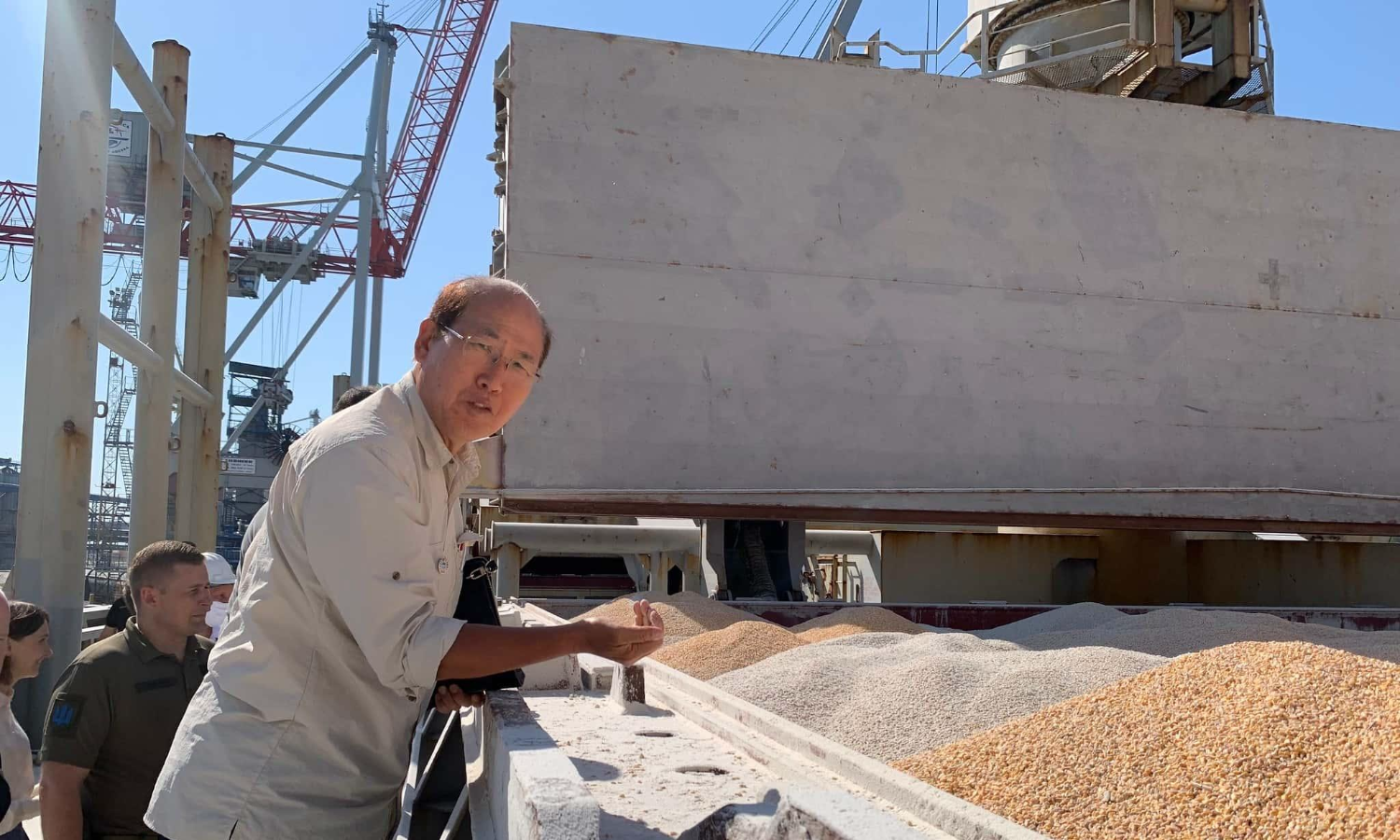End of Black Sea Initiative: What next for Ukraine grain exports?
Russia warns of attacks; Ukraine may depend on Romania’s Constanta port & inland routes for exports

Kitack Lim, Secretary-General, IMO during a visit to Odesa, Ukraine in August 2022
A total of 32.9 million tonnes of agricultural products were exported by Ukraine under the Black Sea initiative till July 16. "The discontinuation of trade flow through this passage, or at least the temporary suspension of vessel movement in the region due to uncertainty, will lead to a decline in shipping demand, particularly for the Supramax and Panamax vessels," says Drewry in its latest update.
Russia pulls out, issues threats
The UN-brokered accord that facilitated the export of Ukrainian grain to global markets via three Black Sea ports expired on July 17. The decision by Russia to terminate the initiative “will strike a blow to people in need everywhere," António Guterres, Secretary-General , United Nations, said earlier this week.
The Black Sea initiative was agreed by Russia, Ukraine, Türkiye and the UN in Istanbul last July along with a parallel accord between the UN and Russia on grain and fertiliser exports from that country. By its decision, Russia has also withdrawn security guarantees for ships navigating in the northwestern part of the Black Sea.
The Secretary-General was "adamant" that the UN would not stop efforts to get food products and fertilisers from both Ukraine and Russia to international markets.
António Guterres, Secretary-General , United Nations. (Credit: UN Photo/Mark Garten)
"I deeply regret to learn of the disruption to the Black Sea initiative," says Kitack Lim, Secretary-General, International Maritime Organization (IMO). "The unimpeded flow of shipping around the globe is of critical importance and central to the work of the IMO. The movement of ships through the Black Sea initiative and its impact in getting food to those who need it most as well as stabilising world food prices is proof that shipping must always continue to move. IMO remains ready to support the UN's efforts to find pathways for solutions to preserve the global supply chain and food security."
In its most explicit threat yet, Russia's military announced it would deem all ships heading for Ukrainian waters from Thursday morning to be potentially carrying weapons, and their flag countries as parties to the war on the Ukrainian side, Reuters reported. Russia also said it was declaring parts of the Black Sea to be unsafe.
Since quitting the deal, Moscow has rained missiles down nightly on Ukraine's two biggest port cities, Odesa and Mykolaiv. "Thursday's strikes appeared to be the worst yet with local authorities in Mykolaiv reporting at least 19 people wounded."
Kitack Lim, Secretary-General, International Maritime Organization
Plenty of challenges ahead
Substantial cut in Ukraine’s exports through the safe passage and subsequent re-direction of exports through alternate routes will likely exacerbate the subdued dry bulk market, Drewry adds in its update. "Additionally, a large quantity of Ukraine’s grain will end up in the EU while China, which is one of the major trade partners of Ukraine, will source more from Australia, hurting the average haulage length. The future of Ukrainian grain exports from the Black Sea looks dark, at least till any new arrangement is made to facilitate the cargo movement from the region."
With safe passage through the Black Sea not being available, Ukraine is likely to depend on alternative routes – through Romania’s Constanta port and inland routes – for its exports. "While the deal helped Ukraine export 16.8 million tonnes of wheat in the previous marketing year, approximately 39 percent of total wheat exported moved outside of the grain corridor through Eastern Europe, particularly Romania. In 2022, Romania re-established rail links with Ukraine and neighbouring Moldova for transporting cargo. The construction of critical railway sections in Moldova which began in 2022 will increase the capacity and speed for Ukrainian products to reach the port of Constanta. In addition, they will also facilitate traffic heading to a group of smaller ports along the Danube river, the main inland waterway route in Europe. The accumulated capacity of these smaller ports can partly ease exports from Ukraine and serve as an important transit centre. "
Tanvi Sharma, Research Analyst - Bulk Shipping, Drewry, says: "Ukraine has cold storage facilities to handle storage of grain but a significant portion was destroyed after the onset of the war last year. It also received movable/temporary storage facilities from other countries but going forward, the problem is the destruction of infrastructure in the country. It will impact harvest area, storage as well as exports."
Even though major exporters like Canada, Brazil and Australia have been increasing their grain exports this season, Drewry expects grain trade to decline in 2023 after having contracted in 2022 as the gap left by Ukraine’s export reduction is unlikely to be filled. "The grain market will be adversely affected, posing challenges for the Supramax and Panamax segments with Russia remaining disconnected from the global payment network SWIFT, Argentina continuing to struggle with severe drought and the U.S. grain exports remaining down YoY."
Ukraine’s exports in Q223 dropped 36 percent quarter-on-quarter, adds Sharma. "With the safe passage through Black Sea gone, we expect a contraction in exports. Additionally, the harvest area in the marketing year 2023-24 is as much as 16 percent lower than last year, according to the data from the Ministry of Agriculture, Ukraine. Therefore, Drewry estimates a reduction of 2-5 percent YoY in exports in calendar year 2023. (Please note exports declined by 41 percent YoY in 2022)."
A truck unloads corn grain at a processing factory in Ukraine. © FAO/Genya Savilov


